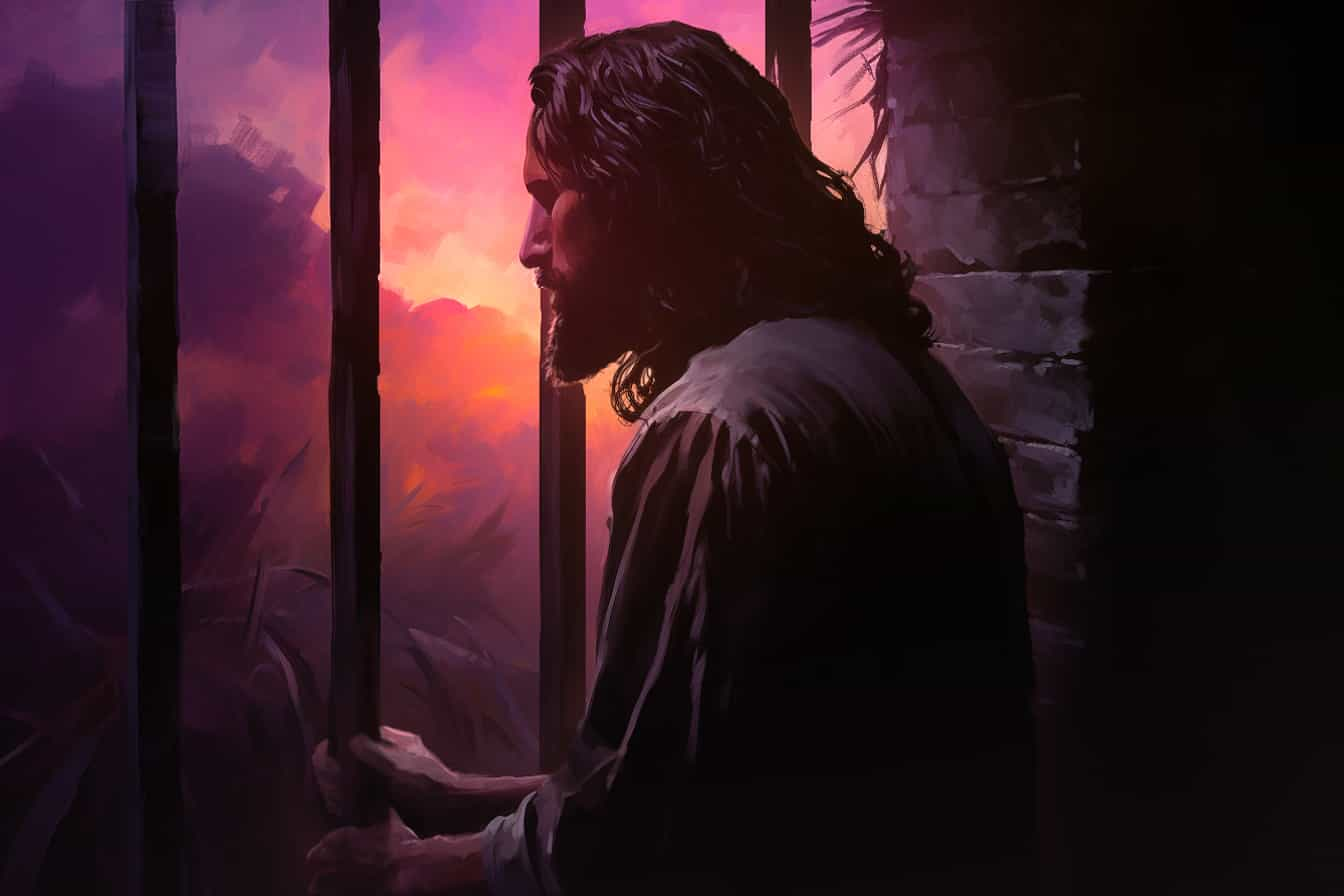Discover Jesus \ Events \John the Baptist in Prison
Tag
John the Baptist in Prison
John was imprisoned by Herod Antipas in 26 CE, enduring over eighteen months of confinement and spiritual testing. Despite challenges to his faith and hearing of Jesus' successes, John prophesied and reaffirmed his mission before his death.

Table of Contents
Summary
John was arrested by Herod Antipas and put in prison on June 12, 26 CE. He spent more than one and a half years suffering his loss of freedom and the loss of the natural surroundings that he loved. When nothing was done to set him free, John’s faith was sorely tested; his faith in Jesus, faith in his own mission, and even his faith in God.
When some of his followers came to visit, they seemed to goad John, telling him about Jesus’ successful public activities while he languished in prison. But John stood firm in his defense of Jesus and eloquently expressed his joy that he was able to be the herald of this messenger from God. He spoke without really thinking and later realized that he had spoken a prophecy.
Jesus loved John and he was aware of the ordeal John was suffering, but he also knew what was awaiting John in the next world. He chose not to interfere with the natural consequences of the rest of John’s life and death. Shortly before his death, John received a message from Jesus that greatly cheered him and that stabilized his faith, readying him for his imminent death.
John the Baptist in Prison
John underwent a solitary and bitter ordeal during his time in prison. Only a handful of his followers were allowed to visit him. Despite yearning to catch a glimpse of Jesus, he had to settle for second-hand accounts of his activities from those disciples who had embraced belief in the Son of Man. He struggled to understand why, if Jesus was indeed the Messiah, he hadn't intervened to rescue him from his agonizing captivity. At times, he wrestled with doubt about Jesus and his mission altogether. Enduring over a year and a half in a harsh prison environment tested this man of nature immensely; his faith and allegiance to Jesus were difficult to maintain. It was a profound trial of faith for John, extending even to his belief in God. There were numerous occasions when he was even tempted to question the authenticity of his own calling and spiritual experiences.
After spending several months in prison, a group of John's disciples visited him. They updated him on Jesus' public activities, remarking, "So you see, Teacher, that he who was with you at the upper Jordan prospers and receives all who come to him. He even feasts with publicans and sinners. You bore courageous witness to him, and yet he does nothing to effect your deliverance." John replied to his friends, saying, "This man can do nothing unless it has been given him by his Father in heaven. You well remember that I said, ‘I am not the Messiah, but I am one sent on before to prepare the way for him.’ And that I did. He who has the bride is the bridegroom, but the friend of the bridegroom who stands near by and hears him rejoices greatly because of the bridegroom’s voice. This, my joy, therefore is fulfilled. He must increase but I must decrease. I am of this earth and have declared my message. Jesus of Nazareth comes down to the earth from heaven and is above us all. The Son of Man has descended from God, and the words of God he will declare to you. For the Father in heaven gives not the spirit by measure to his own Son. The Father loves his Son and will presently put all things in the hands of this Son. He who believes in the Son has eternal life. And these words which I speak are true and abiding."
These disciples were struck with astonishment by John's proclamation, so much so that they left in silence. John himself felt deeply stirred, realizing that he had spoken a prophecy. From that time onward, he never wavered in his belief in Jesus' mission and divinity. Nevertheless, it pained John greatly that Jesus did not send a message, did not visit him, and did not utilize his extraordinary power to free him from prison. However, Jesus was fully aware of these circumstances. Although he held a deep affection for John, he understood his own divine nature which allowed him to see the significant events awaiting John upon his departure from this world. Aware that John's earthly mission had concluded, Jesus restrained himself from intervening in the natural progression of the esteemed preacher's life.
The prolonged period of uncertainty in prison became unbearable for John. Just days before his death, he once again dispatched trusted messengers to Jesus, questioning, "Is my work done? Why do I languish in prison? Are you truly the Messiah, or shall we look for another?"
In response to these inquiries, the Master instructed the messengers, saying, "Go back to John and tell him that I have not forgotten but to suffer me also this, for it becomes us to fulfill all righteousness. Tell John what you have seen and heard—that the poor have good tidings preached to them—and, finally, tell the beloved herald of my earth mission that he shall be abundantly blessed in the age to come if he finds no occasion to doubt and stumble over me." This message brought great solace to John, significantly strengthening his faith and preparing him for his tragic death, which swiftly followed.
Suggested Reading from this Essay

Related People
Zacharias
Father of John the Baptist and husband of Elizabeth.
Gabriel
Chief executive of our local universe.
Herod Antipas
Son of Herod the Great, ruler of Galilee and Perea.
Contributors
MaryJo Garascia, Mike Robinson, Gary Tonge
